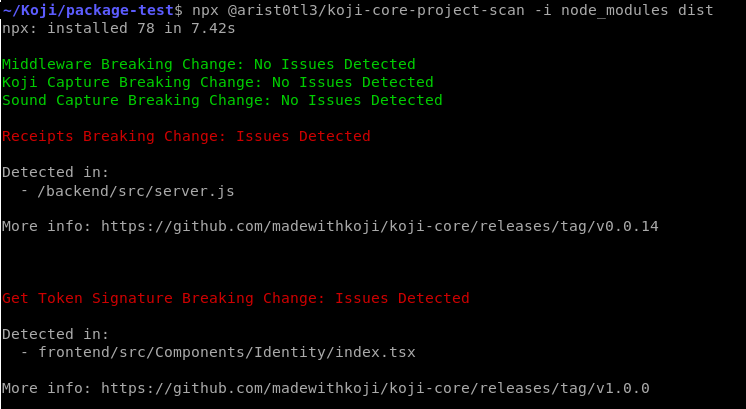npm install @withkoji/core@withkoji/core
The @withkoji/core package enables you to implement core platform features in your Koji app, including customization, in-app purchases, UI controls, messaging, and identity services.
|
Note
|
The @withkoji/core package replaces several deprecated packages. If your Koji app’s code uses any of the deprecated packages, see migrate-koji-core.html. |
Available features
This package provides client-side methods for use on the frontend of your Koji app and server-side methods for use in the backend services of your app. For example:
-
Dynamically get and set customized values.
-
Capture user input and present dialog boxes.
-
Define distinct experiences for different users and views of your Koji app.
-
Manage authentication and authorization for users of your Koji app.
-
Send push notifications to authorized users.
-
Implement in-app purchase transactions in your Koji app.
-
Implement a Koji database for the backend of your Koji app.
-
Track custom analytics events in your Koji app.
-
Implement real-time communication between connected clients in your Koji app.
Installation
Install the package in the frontend and backend services of your Koji project.
Updates
Before updating to a newer version of this package, run the following utility in the root of your Koji project to identify deprecated functionality and breaking changes in your code.
npx @arist0tl3/koji-core-project-scan -i node_modules distThe utility will log any uses of deprecated functionality and provide a link to the relevant release documentation. The output will look something like this example.

For a comprehensive list of changes and versions, see the package release notes in Github.
Basic use
The @withkoji/core package provides a set of modules that are specific to client and server behaviors. For a reference of all available functionality in these modules, see the Frontend and Backend modules.
Frontend
Import the package in your frontend code.
import Koji from '@withkoji/core';Initialize the package with your configuration data.
// Initialize
Koji.config(require('././koji.json'));
// render
render();Indicate that the application is ready to start receiving events.
Koji.ready();Enable the user to upload an image from the frontend of the Koji app.
import Koji from '@withkoji/core';
const captureImage = async () => {
const imageURL = await Koji.ui.capture.image();
console.log(imageURL); // The publicly accessible, CDN-backed path of the user's uploaded image
}Backend
Import the package in your backend code.
import { KojiBackend } from '@withkoji/core';Initialize the package with your configuration data, and use KojiBackend.middleware to scope operations for each customized version of the app.
Add routes for backend operations (for example, use a Koji database).
import { KojiBackend } from '@withkoji/core';
import cors from 'cors';
import express from 'express';
import bodyParser from 'body-parser';
// Import our configuration
import kojiConfig from '../../koji.json';
// Init
const app = express();
// Enable cors for preflight
app.options('*', cors());
// Whitelist all routes with cors
app.use(cors());
// Use express json
app.use(express.json());
// Parse application/json
app.use(bodyParser.json());
// Use Koji's middleware to handle scoping across your app's customized versions
app.use(KojiBackend.middleware(kojiConfig));
// Disable caching
app.use((req, res, next) => {
res.header('Cache-Control', 'private, no-cache, no-store, must-revalidate');
res.header('Expires', '-1');
res.header('Pragma', 'no-cache');
next();
});
// Add routes here - for example:
app.get('/data', (req, res, next) => {
const database = new KojiBackend.Database({ res });
// Look up an item in the items collection
const item = await database.get('items', 'myItemId');
res.status(200).json({
item,
});
});
// Start server
app.listen(process.env.PORT || 3333, null, async (err) => {
if (err) {
console.log(err.message);
}
console.log('[koji] backend started');
});